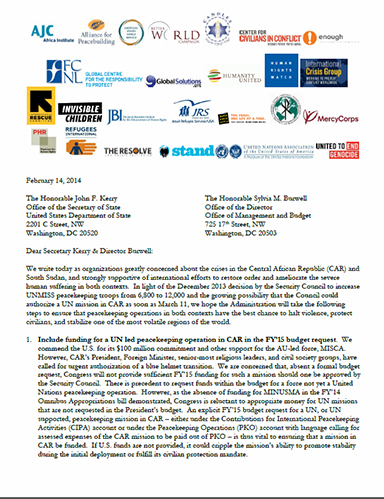
Dear Secretary Kerry & Director Burwell:
We write today as organizations greatly concerned about the crises in the Central African Republic (CAR) and South Sudan, and strongly supportive of international efforts to restore order and ameliorate the severe human suffering in both contexts. In light of the December 2013 decision by the Security Council to increase UNMISS peacekeeping troops from 6,800 to 12,000 and the growing possibility that the Council could authorize a UN mission in CAR as soon as March 11, we hope the Administration will take the following steps to ensure that peacekeeping operations in both contexts have the best chance to halt violence, protect civilians, and stabilize one of the most volatile regions of the world.
1. Include funding for a UN led peacekeeping operation in CAR in the FY’15 budget request. We commend the U.S. for its $100 million commitment and other support for the AU-led force, MISCA. However, CAR’s President, Foreign Minister, senior-most religious leaders, and civil society groups, have called for urgent authorization of a blue helmet transition. We are concerned that, absent a formal budget request, Congress will not provide sufficient FY’15 funding for such a mission should one be approved by the Security Council. There is precedent to request funds within the budget for a force not yet a United Nations peacekeeping operation. However, as the absence of funding for MINUSMA in the FY’14 Omnibus Appropriations bill demonstrated, Congress is reluctant to appropriate money for UN missions that are not requested in the President’s budget. An explicit FY’15 budget request for a UN, or UN supported, peacekeeping mission in CAR – either under the Contributions for International Peacekeeping Activities (CIPA) account or under the Peacekeeping Operations (PKO) account with language calling for assessed expenses of the CAR mission to be paid out of PKO – is thus vital to ensuring that a mission in CAR be funded. If U.S. funds are not provided, it could cripple the mission’s ability to promote stability during the initial deployment or fulfill its civilian protection mandate.
2. Address peacekeeping cap related arrears and mission shortfalls in the FY’15 budget request. Currently, the U.S. is facing an over $350 million shortfall resulting from a combined lack of funding for several missions and a full lift of the peacekeeping cap to 28.3% in Fiscal Years 2013 and 2014. Underfunding peacekeeping missions that the United States has voted for in the Security Council sends a poor signal to international partners and limits U.S. influence in shaping the contours of mission mandates. In addition, it undermines the UN’s ability to persuade troop contributing countries, like those who will be needed in South Sudan and CAR, to send their armed forces into the most urgent crises. Further, peacekeeping missions take months to appropriately plan and establish. Ensuring U.S. financial readiness to support missions will reduce inefficiencies and start up delays.
3. Re-establish robust U.S. diplomatic engagement in both CAR and South Sudan. While the safety and security of U.S. diplomatic personnel is of the highest importance, risk aversion should not preclude U.S. presence in the precise crises that most demand diplomatic engagement. The limits of U.S. political engagement in South Sudan, including the absence of USAID staff, and lack of a U.S. presence in CAR creates coordination challenges for U.S. government implementing partners, inhibits effective information sharing between U.S. policymakers and key local, national and international actors in the conflict, and creates an impression of inconsistency in U.S. policy towards prevention of mass atrocities.
While we understand the complexity of the crises in CAR and South Sudan, we believe that the above recommendations are critical to ensuring that current and any future UN-led operations in said countries have a reasonable chance of stemming the violence, protecting civilians and restoring law and order. Fulfilling these recommendations would also better position the U.S. to advance its international leadership in proactive crisis response by strengthening a range of multilateral policy tools and diplomatic resources that have been impeded by recent Congressional budgetary processes and pressures.
We deeply appreciate your consideration of these requests, and your continued leadership in working to solve some of the most intractable political and security challenges of our day.
Thank you for your time.
Sincerely,
The Africa Institute of AJC
Alliance for Peacebuilding
American Jewish World Service
Better World Campaign
CANDLES Holocaust Museum and Education Center
Center for Civilians in Conflict
Enough Project
Friends Committee on National Legislation
The Global Centre for the Responsibility to Protect
GlobalSolutions.org
Humanity United
Human Rights Watch
International Crisis Group
International Rescue Committee
Invisible Children
Jacob Blaustein Institute for the Advancement of Human Rights
Jesuit Refugee Service/USA
Jewish World Watch
Maryknoll Office for Global Concerns
MercyCorps
Physicians for Human Rights
Refugees International
The Resolve LRA Crisis Initiative
STAND
United Nations Association of the United States of America
United to End Genocide

